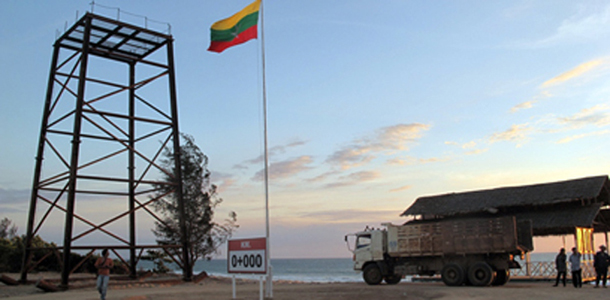Thailand’s state-controlled oil company PTT has begun a feasibility study into funding and building what would be Southeast Asia’s biggest refinery—in Vietnam.
The proposals for a huge US$30 billion plant capable of processing 660,000 barrels of crude oil per day could undermine PTT’s previously declared interest in investing in Burma’s dilapidated and inadequate oil refining industry.
The Burmese Ministry of Energy has said it was in discussions with PTT on building a refinery near Rangoon with a daily processing capacity of 150,000 barrels—three times Burma’s current capability.
Burma has just three small old refineries, which together have a capacity of only 57,000 barrels per day, less than half of the country’s rising petrol and diesel demand. It has virtually no petrochemical making capacities.
Vietnam suffers from similar problems to Burma: plenty of crude oil and natural gas resources but inadequate oil refining and petrochemical production.
Vietnam has only one refinery and must import two-thirds of its domestic fuel oils such as diesel.
But PTT’s mega refinery plan for Vietnam isn’t just about filling that country’s energy fuels shortfall.
“The giant PTT refinery proposal is about developing a downstream fuels export market by proxy,” Bangkok independent energy industries analyst Collin Reynolds told The Irrawaddy.
“PTT plans to sell at least 50 percent of products from this Vietnam refinery into the regional market, which is crying out for diesel, gasoline and other fuels. I dare say some of the fuel would be shipped back to Thailand, where the environmentalist lobby is hampering further expansion of refining and petrochemicals.”
A specialist team has been hired by PTT to complete the study by May next year, when it must report back to the Vietnam government, reported Vietnam’s Thanh Nien newspaper, quoting PTT executive vice president Sukrit Surabotsopon.
“Construction would take another five years and the plant would begin operating in 2020 with a capacity of 33 million tons, almost five times that of [Vietnam’s] sole existing refinery and one of the largest in the world,” said the newspaper last week.
PTT’s decision to press ahead with plans for a mega refinery in Vietnam comes as the Bangkok company’s overseas investment program for the next five years is under review.
PTT, the biggest valued company listed on the Stock Exchange of Thailand, has already slashed its budget for this year by almost 50 percent because of what it termed the knock-on effects of a global economic slowdown. Underlining the industry’s uncertainty, PTT in July cut its investment budget for 2013 by nearly $1.5 billion, even though this had been approved only in April.
The PTT investment review, which could affect Burma plans, is separate to its subsidiary PTTEP, which has several developments in Burma’s Gulf of Martaban territorial waters.
PTTEP invests primarily in oil and gas exploration and development.
Only last week, PTTEP announced that it had found gas in several exploratory wells in the gulf’s M3 block. The announcement gave no indication of the size of the discovery, but PTT said it intended to carry out more drilling early in 2014 and hoped to begin commercial production at M3 in 2016.
PTTEP is planning to begin gas production in its Zawtika field in Burmese waters of the gulf at the end of this year.
However, PTT’s capital spending review coupled with its proposed massive project in Vietnam could result in its outlined plans for Burma being shelved.
In addition to a refinery near Rangoon, PTT has been looking at investing in petrochemical and refining possibilities at Dawei on Burma’s southeast coast as part of a proposed special economic zone, and developing a chain of roadside vehicle fuel stations across the country.
“PTT have not yet announced any investment cutbacks beyond 2013. All the same, the uncertainty surrounding the overall Dawei project and the general lack of infrastructure in Burma does not weigh well alongside Vietnam right now,” said Reynolds.
“None of PTT’s ideas for Dawei seem to make much sense without the development of a port and crude oil import terminal, and the Thais cannot attract any meaningful investors. Dawei might reach fruition in the next decade.”
PTT might be eyeing Vietnam for such a major investment project as the mega refinery because of the export potential,as the Association of Southeast Asian Nations (Asean) moves toward a single market.
Although Burma is opening up economically, lack of infrastructure such as roads and ports and poor electricity supplies pose a serious problem for export-driven investments.
“It’s important for us to ensure we invest at a time that generates the highest returns on investment,” a PTT senior manager told The Irrawaddy in an email, speaking on condition of anonymity.
“We are reviewing plans all the time, and local economic circumstances in target countries will determine which investments are to proceed and which will be likely to be delayed or canceled.”
Meanwhile, Burma’s much awaited offshore licensing round for 30 oil and gas development blocks could face stiff competition from Thailand.
Initial bids for licenses from international companies have already been made for the 30 Burmese blocks. But while an outcome is awaited from Naypyidaw—possibly not until the end of this year—Thailand is preparing to offer 22 blocks for licensing in its territorial waters and also onshore areas.

















